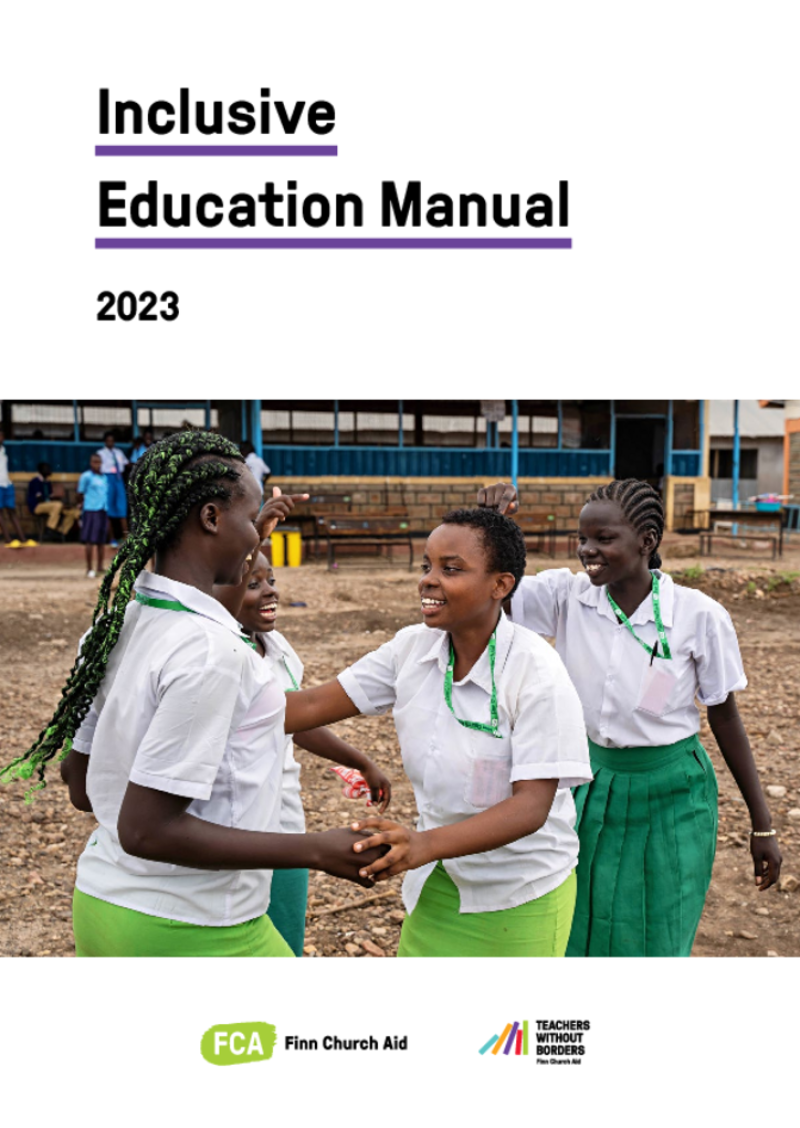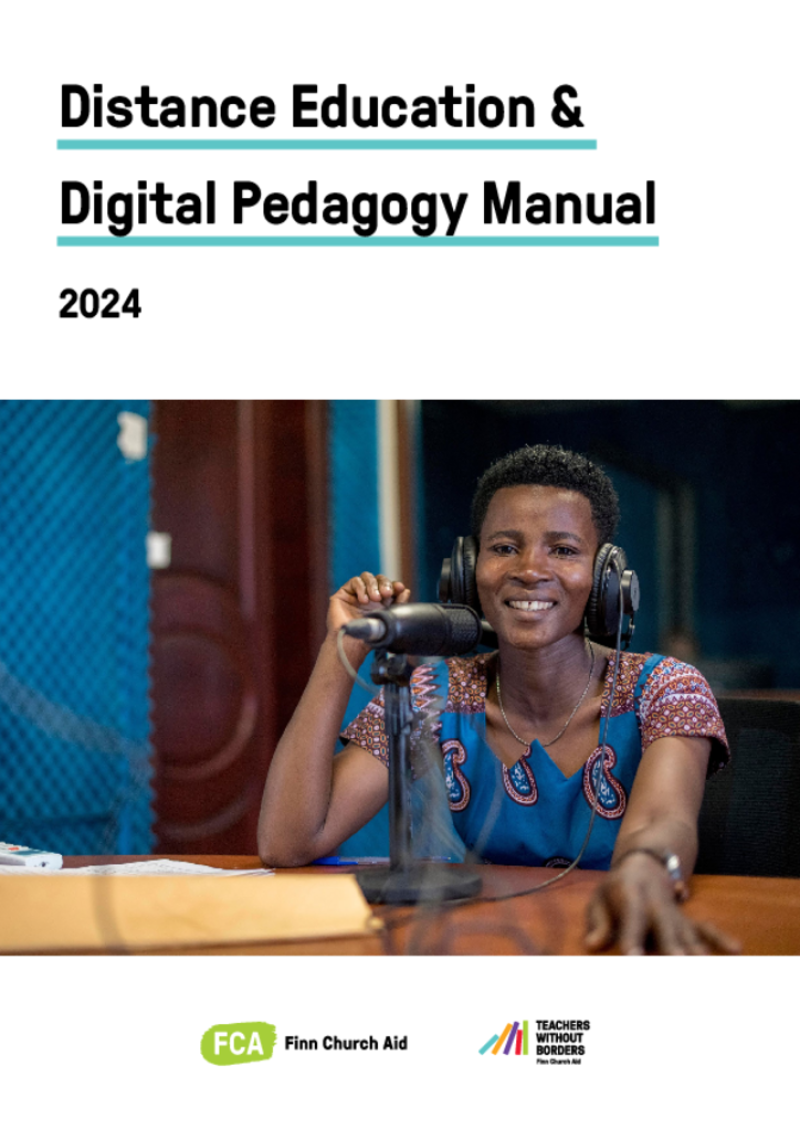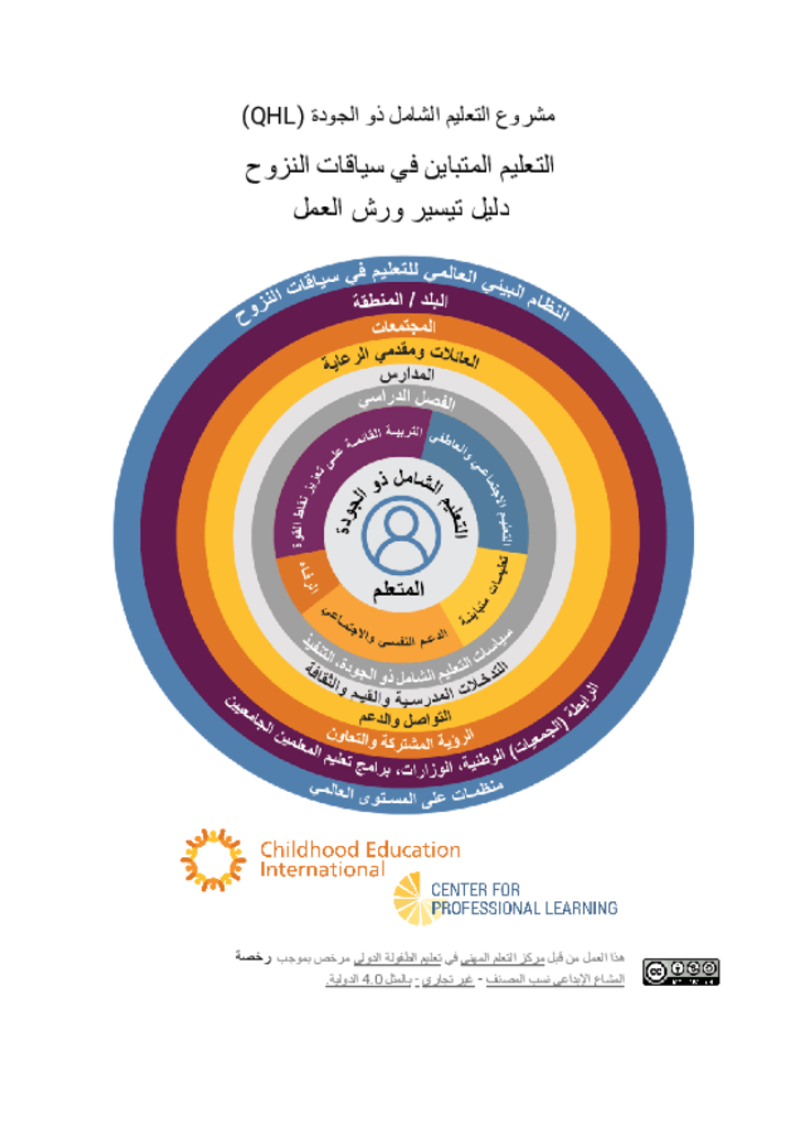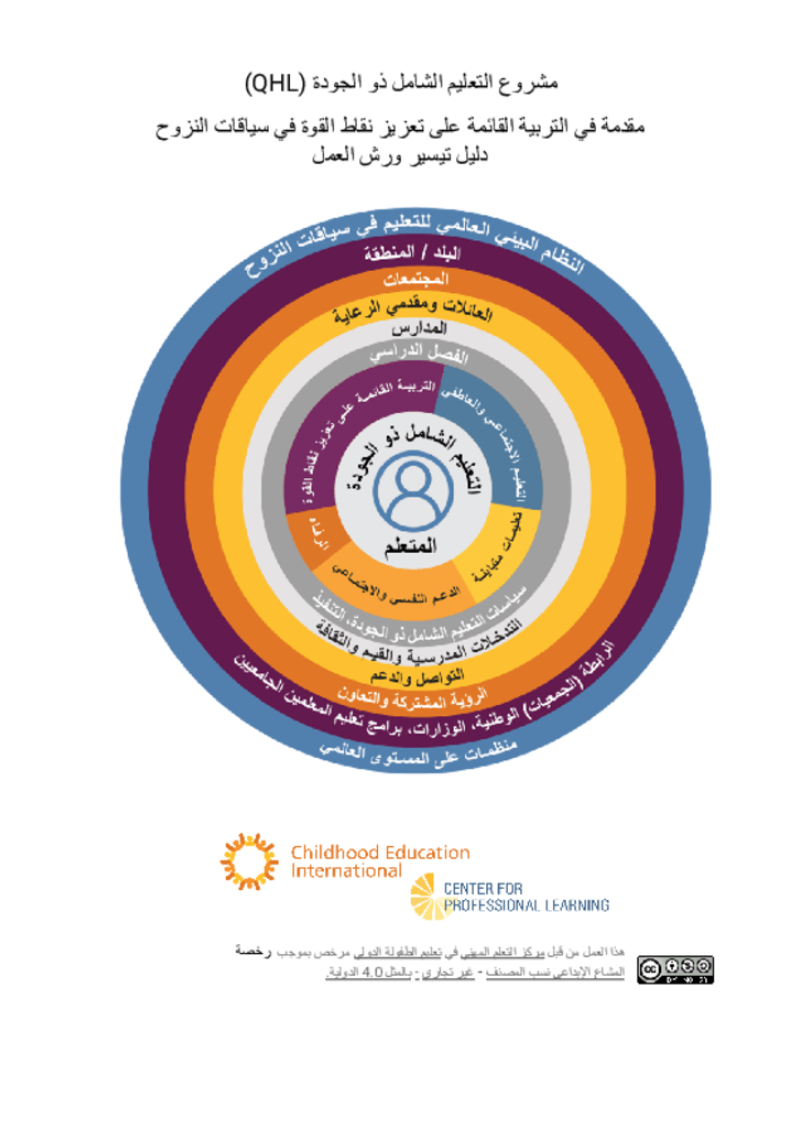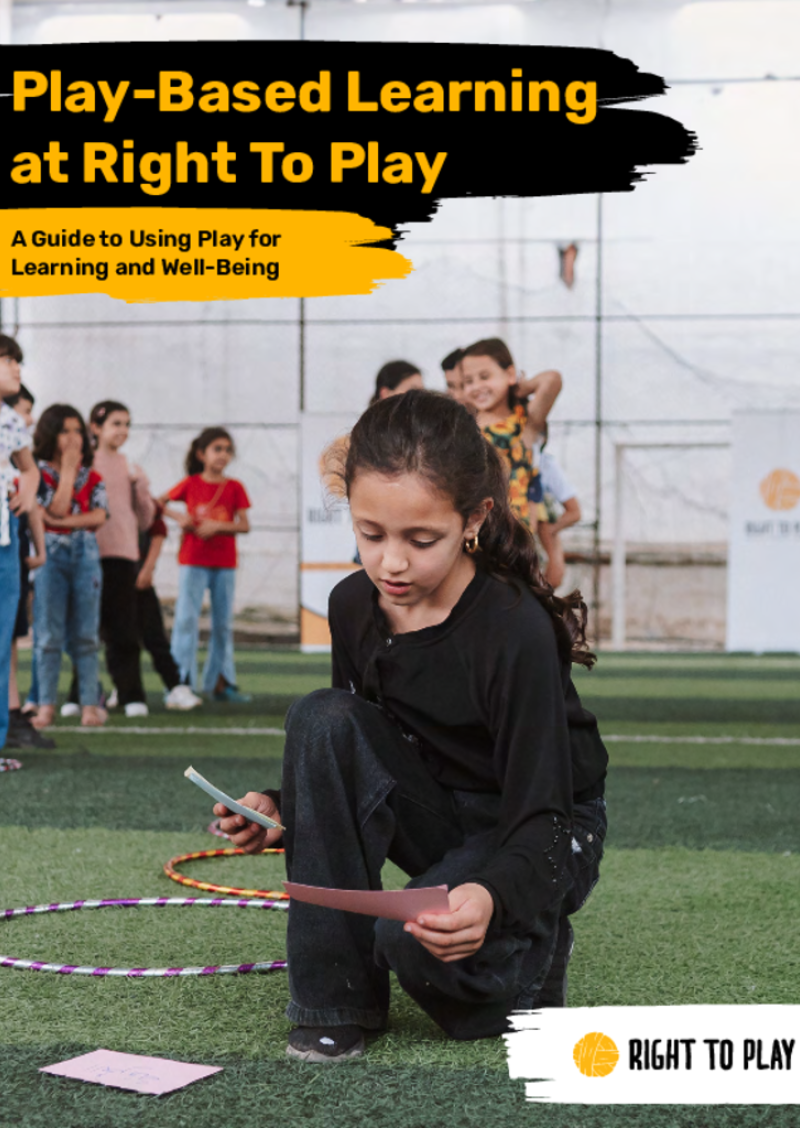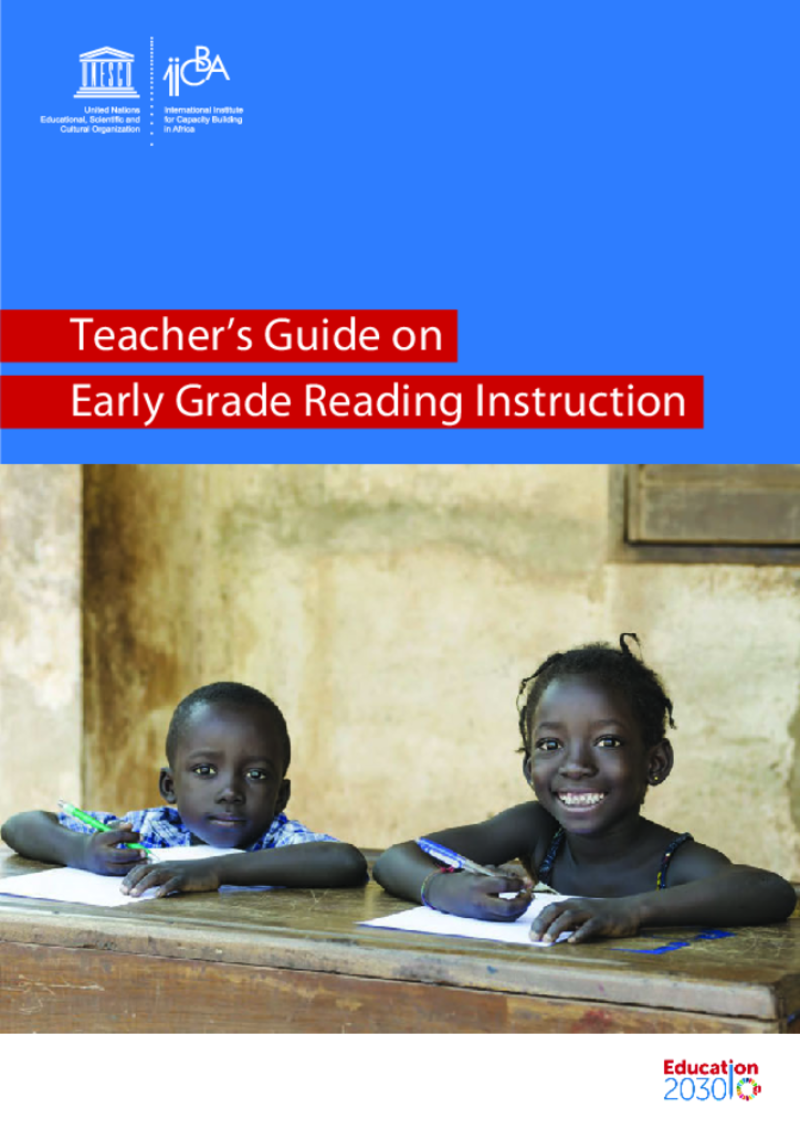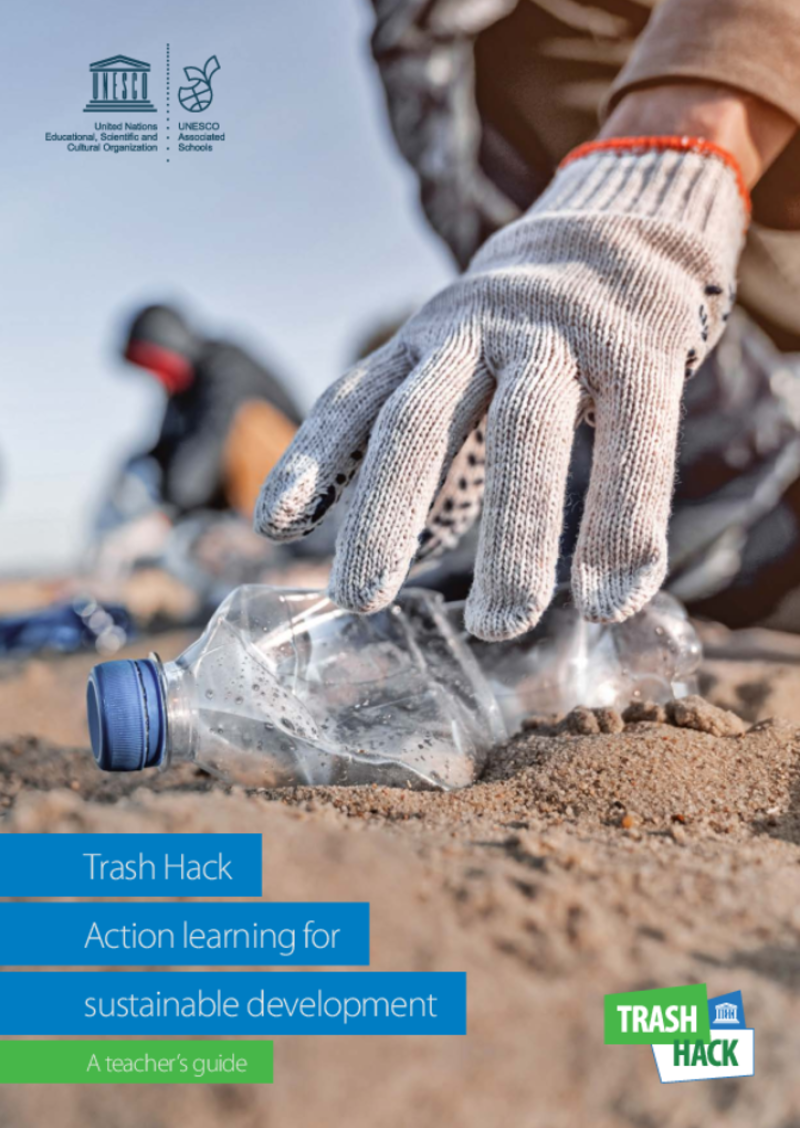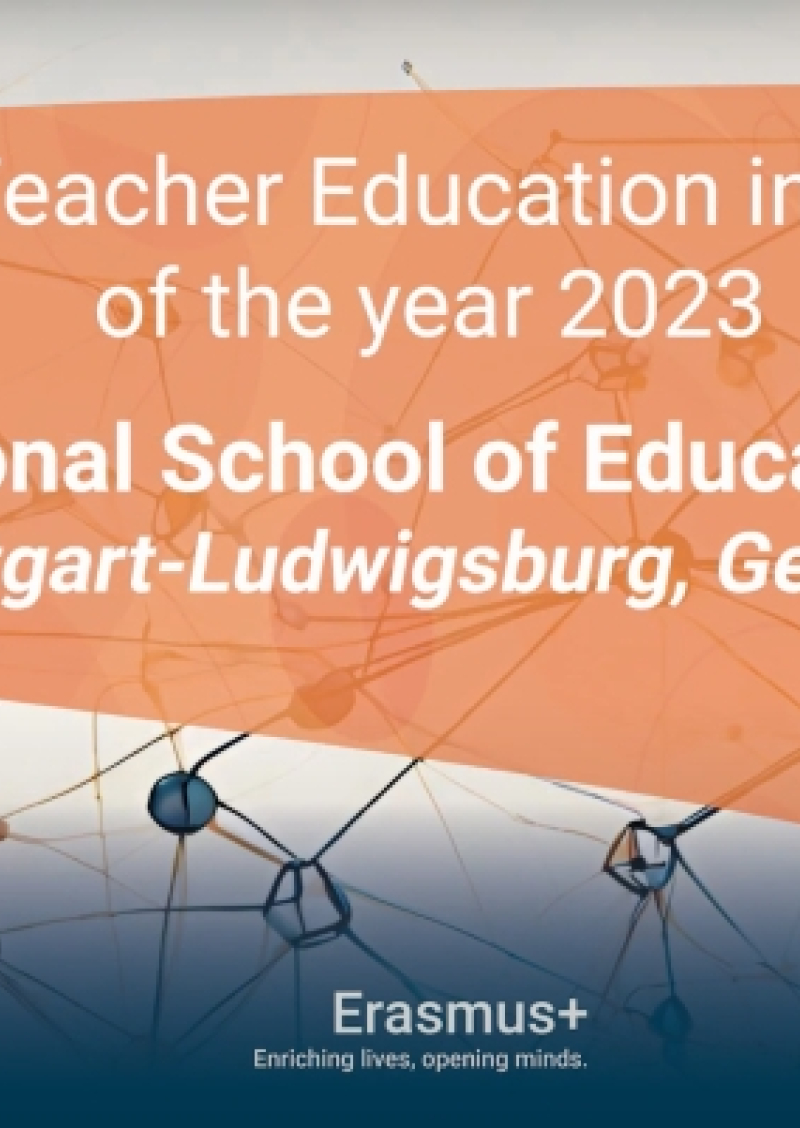مركز موارد المعلمين
عرض 1 - 20 من 92
FCA & TWB Inclusive Education Manual
This Teacher Training Manual on Inclusive Education supports teachers and other education personnel’s continuous professional development in inclusive, quality education especially in diverse low resource contexts and is adaptable for use anywhere in the world. The Inclusive Education Manual directly contributes to realization of several targets of the Agenda 2030 Sustainable Development Goal (SDG) 4 “ensuring inclusive and equitable quality education for all”.
The manual was developed by Finn Church Aid (FCA) and Teachers Without Borders (TWB) Network Finland. The content has been collected and built on the numerous good materials and practices used and co-developed by FCA staff and TWB education experts in different countries and contexts.
The training manual consists of three (3) training modules that can be used flexibly:
- Education, Teacher and School Community,
- Inclusive Education, and
- Positive Classroom and Learning Environment for All Learners.
The content design allows the trainer or facilitator to pick individual modules or sessions and adapt the training content according to the context and target group’s needs.
We hope you find it useful!
FCA & TWB Distance Education & Digital Pedagogy Manual
This teacher training manual on Distance Education & Digital Pedagogy supports teachers and other education personnel’s continuous professional development in pedagogically high-quality distance education and remote learning especially in diverse, low resource contexts and is adaptable for use anywhere in the world.
The manual has been developed by Finn Church Aid (FCA) and Teachers Without Borders (TWB) Finland. The development of the training materials began already in 2020 as a response to the school lock-down situations caused by the COVID-19 pandemic, when teachers and learners quickly had to adapt to remote education modalities. Even though the pandemic has subsided, the need for quality distance education prevails. Ensuring the continuity of learning for all learners is critical in all contexts, even and especially during crisis situations.
The training manual consists of eight (8) training modules that can be used flexibly:
- Distance Education,
- Distance Education Modalities,
- Pedagogy of Digital and Distance Education,
- Psychosocial and Emotional Wellbeing,
- Learner-Centred Methods in Distance Education,
- Home Support – Parents and Caregivers’ Role and Collaboration,
- Inclusive Education, and
- Assessment and Evaluation.
The content design allows the trainer or facilitator to pick individual modules or sessions and adapt the training content according to the context and target group’s needs.
We hope you find it useful!
التعليم المتباين في سياقات النزوح دليل تيسير ورش العمل
في هذا الدليل، هناك مطالبات لدعم استكشاف المحتوى والتطبيق على السياق المحلي. هناك أيضًا نصائح لدعم المعلمين أثناء توفيرهم للمساحة والوقت للتعلم المهني في حياتهم المزدحمة والمجهدة في كثير من الأحيان. أخيرًا، يقدم هذا الدليل بعض النصائح فيما يتعلق بالجوانب الإلكترونية و/أو الجوانب التكنولوجية الأخرى لهذا التدريب.
يهدف مشروع التعلم الشامل عالي الجودة (QHL)، والذي تعد ورشة العمل وجهًا لوجه أحد عناصره، إلى إعداد المعلمين لتقديم دروس عالية الجودة تدعم التعلم الشامل للأطفال والشباب من خلفيات متنوعة (اللاجئين والمهاجرين و/ أو المواطن) داخل البلد المضيف وسياقات النزوح والأزمات. إنهم يعرّفون التعلم الشامل عالي الجودة بأنه ذلك الذي يهتم بما يلي: ● التطوير الأكاديمي والمعرفي وتنمية الهوية، ● التعلم الاجتماعي والعاطفي، و ● الرفاه العقلي/النفسي الاجتماعي والجسدي والذي يوفر: ● تجارب مدرسية إيجابية، ● مشاعر الانتماء والانتماء السلامة، ● النمو والتطور، و ● نتائج عادلة لجميع المتعلمين.
مقدمة في التربية القائمة على تعزيز نقاط القوة في سياقات النزوح دليل تيسير ورش العمل
يهدف هذا الدليل إلى دعم تقديم مجموعة من أربع ورش عمل تمهيدية حول موضوع دعم التربية القائمة على تعزيز نقاط القوة في سياقات الأزمات من خلال تنفيذ أدوات وأنشطة التدريس القائم على تعزيز نقاط القوة ومن خلال الحفاظ على مساحات تعليمية آمنة ومأمونة.
ورش العمل هي نتيجة المساهمات الثاقبة لفريق ملتزم من المعلمين والمعلمين من كينيا ولبنان والنيجر.
أصول علم التّربيّة القائمة على تعزيز نقاط القوّة لتعلّم شامل عالي الجودة
تمّ تصميم هذه الدّورة التّدريبيّة المفتوحة - ذاتيّة الوتيرة، والمعتمدة على أصول التّربيّة القائمة على (نقاط القوّة)؛ للتّعلّم الشّامل عالي الجودة - من قِبَل المعلّمين لزملائهم، وخاصًّة أولئك الّذين يعملون مع المتعلّمين اللاجئين، والضّعفاء. والهدف منها هو تقديم لمحةٍ عامّةٍ عن المصطلحات، والمفاهيم، والممارسات الرّئيسة المتعلّقة بالأساليب التّربوية القائمة على (نقاط القوّة).
سيكون لدى المعلّمين الّذين يُكمِلون هذه الدّورة التّدريبيّة القصيرة عبر الإنترنت، القدرة على ما يلي:
- اكتساب فَهْم عمليّ لماهيّة (طبيعة) طرق التّربيّة القائمة على نقاط القوّة، وأسباب أهمّيتها.
- القدرة على تحديد الطّرق الّتي يمكن من خلالها تطبيق أساليب التّربية القائمة على نقاط القوّة في الفصل الدّراسيّ.
- التّأكد من إمكانيّة تطبيق أصول علم التّربيّة القائمة على نقاط القوّة في سياق عملهم.
سوف تستغرق من 3-4 ساعات، في المتوسط ، لإكمال هذه الدورة. وسيتمّ إصدار شهادة مشاركة عند الانتهاء بنجاح. شكرًا لك على اهتمامك والتزامك بالتّعلّم المهنيّ والتّعليم!
يجري حاليًّا تطوير دليلٍ؛ لاستخدامه في حال عدم توافر الإنترنيت، كأداةٍ موازيةٍ للتّعرّف على طرق التّربيّة القائمة على نقاط القوّة. يُرجَى الاتصال بـ jkasper@ceinternational1892.org ؛ لمناقشة تجربة هذه المادّة الإضافيّة
مُقدِّمة في التّعلّم الاجتماعيّ والعاطفيّ والدّعم النّفسيّ الاجتماعيّ من أجل التّعلّم الشّامل عالي الجودة
تم تطوير هذه الدورة التدريبية عبر الإنترنت ، والتي تُرجمت إلى اللغة العربية ، بناءً على مواد ورشة العمل المصممة بواسطة زملاء مشروع التعلم الشامل عالي الجودة
(QHL) في النيجر. يقدم هذا المساق التعلم الاجتماعي والعاطفي (SEL) ، والدعم النفسي الاجتماعي (PSS) ، وأماكن التعلم الآمنة والشاملة. هذا هو مصدر تعليمي ذاتي
(غير مُيسَّر). المواد المترجمة شبيهة جدًا بالنسخة الإنجليزية.
دمج التّعلّم العاطفي والدّعم النفسي الاجتماعي في دروس التّعلّم الشامل العالي الجودة
دمج التّعلّم العاطفيّ الاجتماعيّ SEL والدّعم النّفسيّ الاجتماعيّ PSS في دروس التّعلّم الشّامل عالي الجودة
تمّ تصميم هذه الدّورة التّدريبيّة المفتوحة - ذاتيّة الوتيرة، والّتي تقوم على دمج (PSS) و (SEL) في الدّروس من أجل التّعلّم الشّامل عالي الجودة - من قِبَل فريق من المعلّمين الّذين يعملون مع المتعلّمين اللاجئين، والضّعفاء في جميع أنحاء لبنان.
وتهدف إلى البناء على ما تمّ تعلّمه مسّبقًا فيما يتعلّق بالتّعلّم الاجتماعيّ والعاطفيّ (SEL)، والدّعم النّفسيّ الاجتماعيّ (PSS)، وذلك لتزويد المعلّمين بالثّقة؛ لتقييم الأنشطة بشكلٍ نقديّ، وتكييّفها مع سياقهم المحليّ، وتقييم مدى تأثيرها على تعلّم الطّلاب ورفاههم.
سيكون لدى المعلّمين الّذين يُكمِلون هذه الدّورة التّدريبيّة القدرة على:
- تحديد مفهوم (PSS) و (SEL).
- دمج (PSS) و (SEL) في خطط الدّروس.
- خلق مساحات آمنة للمتعلّمين النّازحين، واللاجئين، وغيرهم من الطّلاب الضّعفاء.
- التّفكير في الأدوات وطرق التّعليم عند تنفيذ أنشطة (PSS) و (SEL).
- تقييم تكيُّفها، ومدى قدرتها على تنفيذ أنشطة (PSS) و (SEL).
سوف تستغرق من 8-10 ساعة، في المتوسط ، لإكمال هذه الدورة.
Unlocking Potential: How Generative AI Can Help Enhance Career Readiness
Generative AI has the potential to make career education more accessible and impactful by offering personalized guidance and automating routine tasks. By leveraging AI, educators can design more efficient, tailored learning experiences, ensuring that every student—regardless of background—has access to the knowledge, tools, and opportunities they need to prepare for future success.
Join us on October 29th at 2:00pm GMT, as Sumit shares insights from his action research on how Generative AI can enhance career readiness for students from underserved communities, highlighting how one can leverage technology like GenAI to bridge educational gaps and equip students with the skills needed to thrive in future careers.
Register here
A Guide to Using Play for Learning and Well-Being
Right To Play uses a variety of approaches to play to support children’s learning, development, and well-being, including sports, music, theatre, art, and play-based learning.
This document focuses on the play-based learning methodology and approach, and how it can be used for learning and development goals related to Right To Play’s core programmatic areas: early childhood care and education, primary education, gender equality and girls’ well-being, and psycho-social support.
Play & resilience: a toolkit for teachers, caregivers, and other stakeholders
Play is an easy, natural and universal practice that builds resilience. Play comes naturally to all children- and is a seemingly simple and light-hearted phenomenon. The power of play as a pathway to building resilience needs to be leveraged to provide children with the opportunity to further explore play in their home and school environments.
This toolkit is therefore premised on the objectives to build the capacity of various stakeholders such as caregivers/teachers, school managers, curriculum planners and policy makers who are key actors in the process of growth and development of children. It is also aimed at equipping these stakeholders with the knowledge and pedagogical skills to translate research, policy and curriculum to practical knowledge and activities for children in the school environment. The toolkit offers directions for facilitators who will be working with caregivers/teachers using the materials and resources provided and other relevant materials available in an environment where it will be used.
Teacher's guide on early grade reading instruction
Reading is a fundamental ability for all other learning activities. Students can learn only when they comprehend, and this requires appropriate reading skills in the first place. Appropriate reading skills support the learning of increasing amounts of instructional content. This is why children who fail to learn to read during their early years of schooling will encounter more difficulties in later grades and a higher risk of drop out. Quality early grade reading instruction is critical in preventing these challenges and risks as well as in protecting children’s rights to education and ensuring better chances of success in their life.
Teachers are at the center of reading instruction and they need to be trained with pedagogical knowledge and management skills in order to provide students relevant and quality instruction. It has however been noted that teachers in many countries, especially low-income countries in sub-Saharan Africa, lack the proper training and support on ways of teaching early grade reading to their students. Therefore, a comprehensive and practical guide on early grade reading is highly needed to bridge this gap.
This guide aims to empower teachers in Africa by equipping them with the knowledge and skills of early grade reading, including the simple identification of the main pillars of reading, lesson planning and classroom management, taking into account the context in Africa. Subsequently, these teachers will help their students build basic reading skills in their early years of schooling.
A Teacher's Guide for Arts, Music and Drama in Africa
Art, music and drama have had a pivotal role in the livelihood of human beings. This is clear by the wealth of literature, architecture, fine art, theater and music that define human past, present and future. The inherent creative ability and a yearning to express ourselves is what gives value to art, music and drama as companion components in human evolution.
This teacher's guide covers art, music, dance, drama, experiential learning, community engagement, and how to integrate these aspects into curriculum. Additionally, this document provides lesson plans for primary school students in these subject areas.
Pedagogies of Belonging: Educators Building Welcoming Communities in Settings of Conflict and Migration
What would it take to ensure that all young people have access to learning that enables them to feel a sense of belonging and prepares them to help build more peaceful and equitable futures? This is a question we have found educators in contexts of conflict and migration ask of themselves each day. And each day, in classrooms around the world, educators are acting in response to this question.
Educators are figuring out what to teach, ways to teach, and how to foster relationships of learning and belonging.
We learn from educators how they create space for dissent, for dialogue, for trust, for new identities, for future-building, and how they envision and build newly imagined and welcoming communities.
Pedagogies of belonging, featured in this book and in its title, emerge from these ways of thinking and acting by educators. We see across educators that what they teach, how they teach, and why they teach in the ways they do come together to enable all young people to feel a sense of belonging and prepare them to help build more peaceful and equitable futures.
This book is about educators and for educators. It is about the practices educators have developed to create welcoming communities in settings of conflict and migration. Each chapter is a “microportrait” of one educator who we have come to know by spending time in their classroom and school.
We focus on the why and the how of practices educators use. We show, through text and art, how educators learn about their students’ experiences, needs, and desires. We describe how educators develop practices to meet these learning and belonging goals. And we recognize how educators address struggles that necessarily arise in this work. We hope the practices give us each ideas to try out in our own classrooms, schools, and other educational sites.
Each microportrait is grounded in research about educator practices. Authors of the microportraits came to know the educators through research projects that included interviews, observations, and sometimes participatory methods. Each project was at least a few months and at times spanned many years. The microportraits include links to articles that can support deeper learning about the contexts and practices of the educators.
This book is a collective project, and we welcome your participation. The intention of this book is that it lives and grows to include more microportraits over time and more patterns of practices that may emerge. Please be in touch with suggestions, to share your experiences with the practices of these educators, or to contribute a microportrait to the collection.
Global citizenship education in a digital age: teacher guidelines
This publication has been designed both for new and experienced teachers, as well as other professionals working in non-formal education settings that engage with upper primary and secondary students.
Purpose:
1.By using principles of GCED, digital citizenship, and media and information literacy, the guidelines aim to build the capacities of teachers to prepare learners to understand the implications of global and digital transformations on education, and to build opportunities to practice ethical and responsible behaviours in physical and digital environments. They provide guidance on tapping into the positive potential of the digital transformation, including through new access to information, possibilities of connection, and the creation of tailored content.
2. Build learners’ capacities to think critically about the influences and content that they encounter and engage in creating in physical and digital spaces.
3. Shape learners’ understanding of global challenges and how they can contribute to the Sustainable Development Goals (SDGs) through globally oriented digital citizenship.
Trash hack action learning for sustainable development: a teacher's guide
This short guide provides teachers with action-based approaches to address waste and trash management for sustainable development. It contains infographics and factsheets, inspiring initiatives taken by youth all around the world and activities that can be implemented in class or outside, over one day or several class sessions.
A course for the ages: project-based learning with eTwinning/Erasmus+ for interculturality
In the blended-learning course, guest speakers such as eTwinning moderators and ITE ambassadors from Germany and Europe give motivating talks to the student teachers about their experiences. The course meets via Zoom once a week for 90 minutes. All the classwork and learning activities take place via a Moodle classroom, so students don’t travel anywhere.
This course won the eTwinning for future teachers – European Award for Initial Teacher Education and they are seeking to share their course with other Initial Teacher Education institutions. Access an OER syllabus for the course here.
For more information about the course, taking part in projects, registering for the October 2024 Stuttgart University course or becoming a guest speaker, please contact Professor Richard Powers at richard.powers@ilw.uni-stuttgart.de
Link for syllabus: https://drive.google.com/file/d/1mi2qveVC3AZf33YJlB2P9AlO9-vrGREC/view?usp=drive_link
